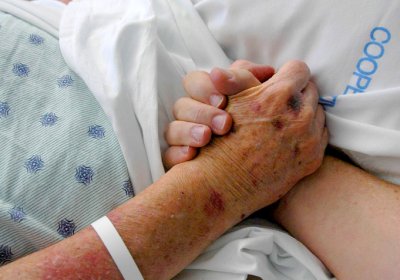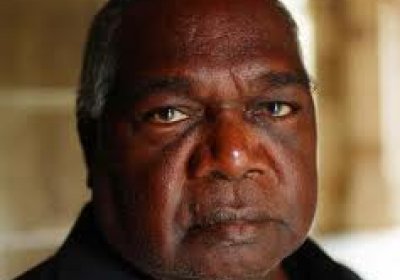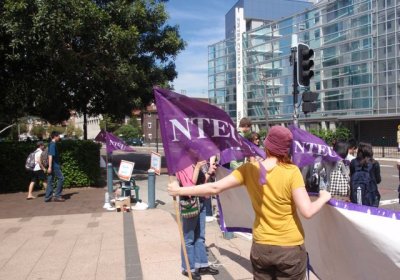In Green Left Weekly #861, Solidarity’s Paddy Gibson addressed a debate that from time to time comes up among activists opposing the NT intervention: whether an assimilationist agenda or mining interests are behind the intervention.
Emma Murphy
Mining magnate Andrew “Twiggy” Forrest had an opportunity on ABC’s November 1 screening of Q&A to defend his record on Aboriginal employment. He didn’t do very well.
“You can see that through Generation One, a real challenge to fill those jobs, because we've proven for all time that corporate Australia — in fact every Australian — isn't racist”, Forrest said.
“We do love our first Australians. We do want to help them as much as we can but we can do it without just throwing money, and I believe I could do more.”
My Name is Rachel Corrie is a play based on the letters and diaries of the US peace activist killed by an Israeli military bulldozer in the Gaza Strip in 2003.
The play will run in Melbourne over November 3-14. This follows a sellout season at the 2010 Adelaide Fringe Festival.
In January 2003, Rachel Corrie travelled to Palestine as part of the International Solidarity Movement. She was part of a nonviolent protest against the State of Israel’s policy of demolishing Palestinian housing to expand Jewish settlement in the Occupied Territories.
Anti-corporate activists will target the second day of the $US8000-a-head Forbes Global CEO Conference, calling for the needs of people and the planet to be put ahead of the interests of the billionaires.
The “Billionaire Pirates” will make an appearance, targeting the conference's theme of “Full Sail Ahead”, and demanding entry alongside their corporate pirate mates.
On September 10, the commercial television regulator, Commercials Advice (CAD) withdrew approval for the screening of a pro-euthanasia ad by Exit International on September 12.
Exit International condemned the decision as an attack on free speech. According to its website, Exit International is ”a leading end-of-life choices (voluntary euthanasia/ assisted suicide) information and advocacy organisation”.
Equality of access and outcomes in Indigenous education was a key demand at the 2010 Garma Festival, held over August 6-10. Up to 1200 visitors from around Australia and the world joined 2-3000 Yolngu people for the famous festival in north-east Arnhem Land.
Each afternoon, clan groups from across Arnhem Land, Kunnunurra, Groote Eylandt and Central Australia performed traditional song and dance. Evenings featured Aboriginal bands from across the Top End, and films by and about Aboriginal issues. The mornings were dedicated to forums and workshops.
Review: Vale Kwementyaye Ryder — a photo essay
Bob Gosford, The Northern Myth
On July 7, members of the National Tertiary Education Union (NTEU) at the University of New South Wales (UNSW) started receiving letters from the university that said they had been stood down without pay for imposing a ban on the recording and transmission of student results to the university.
Unions NSW has called a mass rally and march in Sydney at noon on July 20 in support of South Australian construction worker Ark Tribe, who faces court in Adelaide that day.
Tribe faces jail for refusing to be interrogated by the Australian Building and Construction Commission, the special police force set up to break the power of the building unions. The set up by the former Coalition federal government and continues under Labor.
Wiya! Angela Pamela
by the Super Raelene Brothers & the Little Sisters Collective
Review by Emma Murphy
Wiya! Angela Pamela, a protest song in three languages with an incredibly catchy base and back beat, is the result of collaboration between funk-folk band the Super Raelene Brothers and the Little Sisters Collective, two Alice Springs-based groups.
The song, in Western Arrernte and Luritja, with a smattering of English, is in response to — and part of a campaign against — the proposed Angela Pamela uranium mine.
Refugee advocates have launched the “Bring them home, minister Evans!” campaign in response to the news that 92-year-old Irene Joseph, deported to Sri Lanka with her 68-year-old son on March 5, had collapsed and almost died in the village where they now live.
Joseph is permanent resident of Australia and had lived here since 1979. In 1996, when she re-entered Australia after a holiday, she was mistakenly issued with a temporary visa.
Politicians from the Coalition and Labor Party are proposing nearly identical housing polices for remote Aboriginal communities — and both ignore the experiences of Aboriginal people themselves.
- Previous page
- Page 7
- Next page







